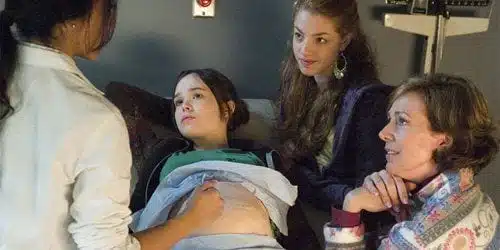
I’m a planet.
— Juno MacDuff (Ellen Page)
When we pulled up and I saw them shooting my movie, there were just tears streaming down my face.
— Diablo Cody, Entertainment Weekly (November 2007)
Juno pulls off a questionable feat. A precious movie about a 16-year-old girl’s unplanned pregnancy, it manages to avoid any significant emotional depths, despite its plainly complex subject. Instead, it works hard at maintaining its indie cred, by way of an eclectic soundtrack and detached coolness. The result: both the film and its titular character are defiantly hip and flawed.
The movie opens with an extreme long shot of Juno (Ellen Page) stationed in the far corner of the frame, visually opposed to a comfy living room furniture set currently laid out in her neighbor’s front yard. Standing apart from these relics of a “normal” family life, she chugs on a gallon of Sunny Delight.
The scene sets up what we will quickly come to know about Juno: she’s acerbic and bored. Unlike the non-conformist girls of teen movies past, however, she doesn’t seem to have to try quite as hard, her rebel status denoted by boys’ jeans, ponytail, and a lumbering gait. Also helpful, her gorgeous cheerleader best friend Leah (Olivia Thirlby) isn’t an obviously flat-personality foil (see: Mena Suvari to Thora Birch in American Beauty), their compatibility making Juno seem all the more confident and smart.
With such a good head on her shoulders, it’s little wonder that Juno takes the process of pregnancy testing in stride, and with virtually no self-consciousness. Breezing into the local convenience mart, she selects a “Teen Wave” pregnancy test from the shelf, her third consecutive, and heads to the store’s restroom. As she emerges, positive test in hand, she shakes it in disbelief. To this, the clerk (Rainn Wilson) remarks, “That ain’t no Etch-a-Sketch. That’s one doodle that can’t be un-did, Homeskillet.” They proceed to exchange dialogue so sharp and richly referential (“Face it, your eggo is preggo.”), the scene is sapped of any possible gravitas. It’s Juno‘s “Royale with Cheese” moment, introducing its crowning joy and largest liability: stylized dialogue. At this point, you’re either along for the ride, or prepared to sulk in the backseat for the rest of the film.
After consulting Leah and her babydaddy Paulie (Michael Cera), Juno opts to “Nip it in the bud, before it gets worse.” Even as she comes up with this solution in a rather cavalier manner, it’s worth noting that no one in the film ever actually utters the word “abortion.” In fact, it’s never an option in this film. When Juno embarks to the clinic alone, she encounters a Korean classmate, Su-Chin (Valerie Tate), picketing in the parking lot, repeating an inarticulate pro-life protest, “All babies want to get borned!” Inside, the clinic appears a low-income house of horrors. Urged to divulge “Every score and every sore” to a pierced, gum-smacking receptionist, the out-of-place Juno leaves almost immediately. Indeed, this doodle can’t be un-did.
Here, the idea seems to be that once Juno has a chance to “think” it through, she must allow her baby to be borned. Better still, she and Leah look through the PennySaver and find a picture perfect couple looking to adopt. Leah endorses them full-heartedly: “The only thing missing is your bastard.” Thus it would seem adoption is “best.” When Juno travels with her father (J.K. Simmons) to meet the couple and arrange the details, Vanessa (Jennifer Garner) and Mark (Jason Bateman) do appear to have everything to offer the baby that Juno doesn’t: a nice home, good schools, lots of time and attention. In this way, the film urges Juno to indulge Vanessa’s lifelong dream of motherhood, for which she is so clearly suited. Just as predictably, the tension between Vanessa’s intense desire for a baby and Juno’s indifference towards her own initiates a competition between the two females, intensified by a not-so-latent sexual tension between Mark and Juno.
Churning out witty retorts like rapid-fire Internet chat, Juno contends with her life as a high school pariah and baby-incubator, complaining mostly about her size and never apparently questioning the many implications of her condition or decision. The small potential wrench in the film’s slick works is her complicated relationship with Paulie. Her efforts to reconcile with him are, sadly, buried at the end of the second act. While Juno’s snarky façade is somewhat diminished in Paulie’s earnestness, suggesting how comfortable she feels with him, it’s Michael Cera’s performance that grounds Juno‘s most touching and revealing scenes. It’s ironic that a film so charmed by its own leading lady fails to pay enough attention to the boy who charms her back.
The movie is surely enamored of its over-stylization, but writer Diablo Cody and director Jason Reitman most often maneuver away from many looming clichés. It does this through a series of plot acrobatics that underline the movie’s hip unconventionality, even as they also signal an actual investment in Juno’s interests and happiness — a welcome distinction from, say, Judd Apatow’s version of the unexpected pregnancy comedy. And that in itself is a kind of unconventionality. This makes it all the more disappointing that a key point — manifested in Juno’s tearful breakdown and recuperation while driving on the side of a country road — feels pat and familiar. For all its work to be so different, Juno occasionally is the same.

